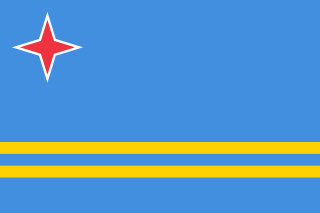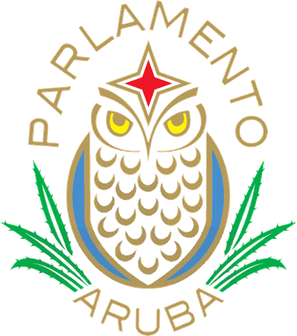
Aruba, officially the Country of Aruba is a constituent country of the Kingdom of the Netherlands physically located in the mid-south of the Caribbean Sea, about 29 kilometres (18 mi) north of the Venezuela peninsula of Paraguaná and 80 kilometres (50 mi) northwest of Curaçao. It measures 32 kilometres (20 mi) long from its northwestern to its southeastern end and 10 kilometres (6 mi) across at its widest point. Together with Bonaire and Curaçao, Aruba forms a group referred to as the ABC islands. Collectively, these and the other three Dutch substantial islands in the Caribbean are often called the Dutch Caribbean, of which Aruba has about one-third of the population. In 1986, it became a constituent country within the Kingdom of the Netherlands, and acquired the formal name the Country of Aruba.

The Netherlands Antilles was a constituent country of the Kingdom of the Netherlands. The country consisted of several island territories located in the Caribbean Sea. The islands were also informally known as the Dutch Antilles. The country came into being in 1954 as the autonomous successor of the Dutch colony of Curaçao and Dependencies. The Antilles were dissolved in 2010. The Dutch colony of Surinam, although it was relatively close by on the continent of South America, did not become part of the Netherlands Antilles but became a separate autonomous country in 1954. All the island territories that belonged to the Netherlands Antilles remain part of the kingdom today, although the legal status of each differs. As a group they are still commonly called the Dutch Caribbean, regardless of their legal status. People from this former territory continue to be called Antilleans in the Netherlands.

Gilberto François "Betico" Croes was an Aruban political activist who was a proponent for Aruba's separation from the Netherlands Antilles. This eventually occurred in 1986, but following a car accident on 31 December 1985, Croes lapsed into a coma and never became conscious to see his accomplishment. He is best remembered as "Libertador" (liberator) and as father of the Aruban people.
Same-sex marriages are not performed in Aruba, Curaçao, or Sint Maarten, which are constituent countries of the Kingdom of the Netherlands. The islands were obliged after several court rulings to register any marriage registered in the Kingdom, but this primarily considers residency rights and they do not have to give same-sex marriages the same legal effect as opposite-sex marriages. Marriage in the European territory of the Netherlands, as well as in the Caribbean municipalities of Bonaire, Sint Eustatius and Saba, is open to any two people irrespective of sex.

The Parliament of Aruba is the unicameral legislature or parliament of Aruba. The parliament has 21 members, elected for a four-year term by proportional representation. Each member holds their seats until the parliament is dissolved, which is every four years by a general election. The leader of the party which gains a majority of seats usually becomes the Prime Minister.

The Charter for the Kingdom of the Netherlands is a legal instrument that sets out the political relationship between the four countries that constitute the Kingdom of the Netherlands: Aruba, Curaçao, and Sint Maarten in the Caribbean and the Netherlands in Europe. It is the leading legal document of the Kingdom. The Constitution of the Netherlands and the Basic Laws of the three other countries are legally subordinate to the Charter.

The Netherlands Antilles was an autonomous Caribbean country within the Kingdom of the Netherlands. It was dissolved on 10 October 2010.
The Council of Ministers of the Kingdom is the executive council of the Kingdom of the Netherlands, which is a state consisting of four constituent countries: Aruba, Curaçao, the Netherlands, and Sint Maarten. The Council of Ministers of the Kingdom consists of the Council of Ministers of the Netherlands complemented by one Minister Plenipotentiary of Aruba, one Minister Plenipotentiary of Curaçao, and one Minister Plenipotentiary of Sint Maarten. The Prime Minister of the Netherlands chairs the Council of Ministers of the Kingdom. Together with the King, the Council of Ministers of the Kingdom forms the Government of the Kingdom, also known as the Crown.

The Netherlands Antilles participated at the Olympic Games from 1952 until 2008. As a constituent country of the Kingdom of the Netherlands, it supported the Netherlands' boycott of the 1956 Games and also joined the American-led boycott of the 1980 Summer Olympics. The Netherlands Antilles participated in the Winter Olympic Games twice.

The Kingdom of the Netherlands, commonly known as simply the Netherlands, is a sovereign state and constitutional monarchy with 98% of its territory and population in Western Europe and with several small West Indian island territories in the Caribbean.

The Caribbean Netherlands are the three public bodies of the Netherlands that are located in the Caribbean Sea. They consist of the islands of Bonaire, Sint Eustatius and Saba, although the term "Caribbean Netherlands" is sometimes used to refer to all of the islands in the Dutch Caribbean. In legislation, the three islands are also known as Bonaire, Sint Eustatius and Saba or the BES islands. The islands are currently classified as public bodies in the Netherlands and as overseas countries and territories of the European Union; thus, EU law does not automatically apply.

A common visa exists since the end of 2010 for the territories of Aruba, Curaçao, Sint Maarten and the Caribbean Netherlands which form together the territory of the Kingdom of the Netherlands in the Caribbean. The visa is not valid for the European part of the Netherlands, which is part of the Schengen Area.

Curaçao is one of the three autonomous countries of the Kingdom of the Netherlands. It has a constitution which governs its constitutional organization and which has been approved by a country law adopted by a two-thirds majority of the local parliament, in application of Chapter IV of the Charter for the Kingdom of the Netherlands dating from 1954 and reformed in 2010.

The Colony of Curaçao and Dependencies was a Dutch colony in the Caribbean Sea from 1815 until 1828 and from 1845 until 1954. Between 1936 and 1948, the area was officially known as the Territory of Curaçao, and after 1948 as the Netherlands Antilles. With the proclamation of the Charter for the Kingdom of the Netherlands on 15 December 1954, the Netherlands Antilles attained equal status with the Netherlands proper and Suriname in the new Kingdom of the Netherlands.

The Dutch Caribbean are the territories, colonies, and countries, former and current, of the Dutch Empire and the Kingdom of the Netherlands in the Caribbean Sea. They are in the north and south-west of the Lesser Antilles archipelago.
Antonito Gordiano "Mito" Croes was an Aruban politician of the Aruban People's Party. He served as Minister Plenipotentiary of Aruba from 1994 to 2001. He previously served as member of the Estates and government minister of the Netherlands Antilles and Aruba.

Evelyna Christina "Evelyn" Wever-Croes is an Aruban politician and current Prime Minister of Aruba, serving since November 2017. She is the first woman to hold this office. She is a member of the People's Electoral Movement (MEP) and has been the leader of the party since 2011.

Dominico Felipe "Don" Martina is a Curaçaoan politician. He served two terms as Prime Minister of the Netherlands Antilles. His first term lasted from November 1979 to October 1984 and his second term from January 1986 to July 1988.

Sylvius Gerard Marie "Boy" Rozendal was an Curaçao politician and journalist. He served as Prime Minister of the Netherlands Antilles from 1971 until 1975, Minister of Finance and Deputy Prime Minister from 1969 until 1971, and Minister Plenipotentiary of the Netherlands Antilles from 1971 until 1975.

John William Merryweather was an Aruban landscape architect and politician. He served as the first Minister Plenipotentiary of Aruba from 1986 until 1989.














